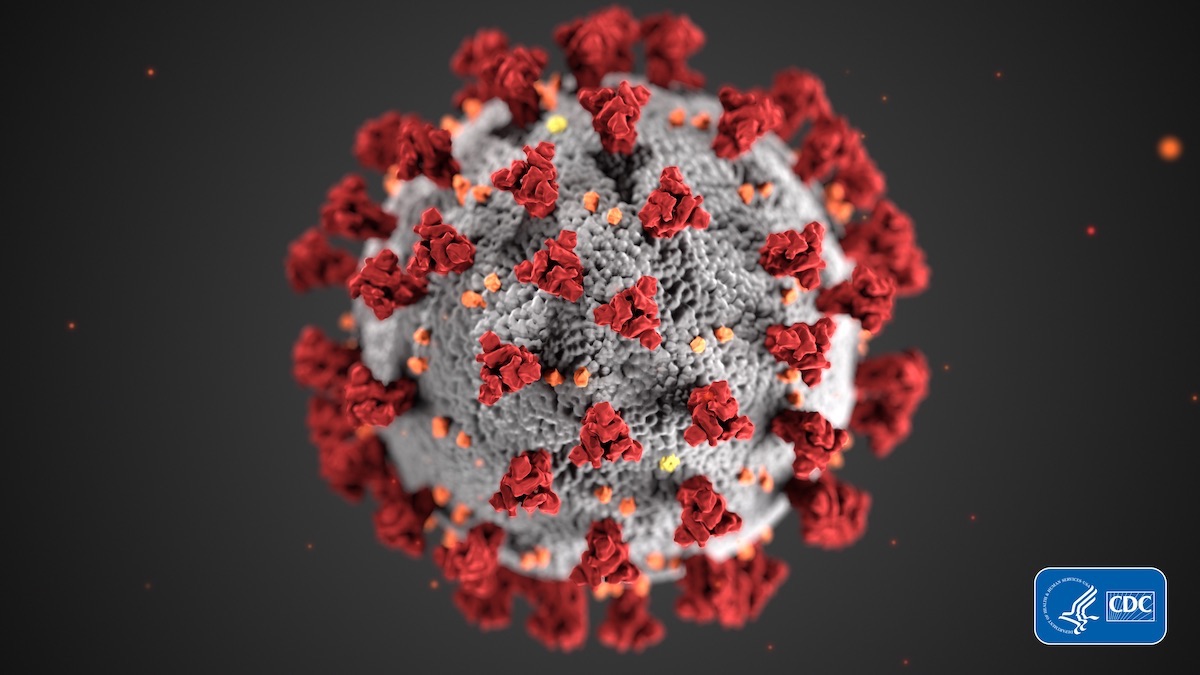The U.S. has a standard disaster plan. Everyone who lived through Hurricane Irma knows it: the incident command system. Within that plan are types of incidents — like hurricanes or pandemics.
“It’s part of our plan for the county, and the state and our federal government,” said Bob Eadie, head of the Florida Department of Health in Monroe County. He said he regards the possible spread in hurricane terms, as well.
“Right now, we are in the cone of uncertainty. We know something is headed our way, but we don’t know what the final outcome will be. And we also know there are some things we need to be prepared for.”
Monroe County’s Emergency Management Director Shannon Weiner and Eadie have been meeting weekly since January. This week, the conversation widened to include hospitals and county officials and other agencies to ensure all partners have the staff, training and supplies to respond. And, if not, the specifics of their needs.
Right now the message is simple: Get a flu shot, wash your hands, cover your cough.
“I don’t want to minimize the spread of coronavirus,” he said, “ but it is not an end-of-the-world situation,”
Eadie said 80% of people exposed to the virus would have only mild symptoms, 15% would contract a more serious case, and of those only 3% would need to be hospitalized.
“Right now, we are in the cone of uncertainty. We know something is headed our way, but we don’t know what the final outcome will be. And we also know there are some things we need to be prepared for.”
—Bob Eadie, head of the Florida Department of Health in Monroe County
“And those 3% usually have some type of medical condition that predisposed them to the severe reaction,” Eadie said.
The most important thing the public can do is seek out information from reliable sources: Visit floridahealth.gov and cdc.gov.
—Sara Matthis
What’s all the hype surrounding coronavirus? A local doctor says it’s the transmission more than anything.
Coronavirus, specifically COVID-19, can go undetected for two weeks. In some settings, the virus has an 85% chance to pass from an infected host individual or group to a particular individual or group. The virus spreads from person to person, primarily from close contact when people touch an “infected” object then touch their mouth or eyes.
Dr. Tom Morrison, emergency room director at Mariners and Fishermen’s hospitals, said there are some respiratory droplets produced when an infected person coughs or sneezes, but it is not the principal mode of transmission. Also, masks do not prevent exposure and can make the situation worse, Morrison said.
Reports are increasing across the country over possible and confirmed cases from Washington state and New York to Florida. Reports out of China say around 2 million have been affected. According to Morrison, COVID-19 has spread much more than is commonly realized. He said the World Health Organization estimates 10 million people have been affected by COVID-19 and the Centers for Disease Control and Prevention has a more conservative estimate of 6 million.
Is it the next worldwide plague? Morrison says “no.”
“The reality is the influenza virus remains a more sinister and serious outbreak,” he said.”In regards to treatment, the only treatment for COVID-19 is supportive care. For influenza, we do have the flu vaccine, which reduces symptoms and if you get the flu, Tamiflu to shorten the lifespan of the disease. Remember that other strains of coronavirus are known principally as the common cold and run with rhinovirus.”
As to where people could be more susceptible to coronavirus, Morrison said reports show that just over 40% of coronavirus transmissions have occurred in a hospital or health care setting. The CDC’s most recent report says that number could be as high as 60%, Morrison said.
“When you look at where people are getting the virus from, they’re getting it from nursing homes, urgent cares, emergency rooms and hospitals,” he said. “Coronavirus requires a certain type of seclusion and a steady amount of presence for you to acquire it.”
Along with education about coronavirus, Morrison emphasizes the importance of hand-washing.
“Everybody is wearing masks, but they also need to be washing their hands after touching door knobs or shaking hands,” he said. “Only very certain types of masks are effective. Most I see utilized in social media or the news are ineffective. Nothing can replace keeping your hands clean.”
— Jim McCarthy
Will coronavirus close Keys schools?
Monroe County School Superintendent Mark Porter said he is working closely with the Florida Department of Health in Monroe County and doesn’t know whether a local school will have to close down if a student or staff member contracts coronavirus.
“The Florida Department of Health has the lead role here, and we’re in constant communication,” said Porter.
Two schools in suburban Seattle, Washington, closed for a day or more for “deep cleaning.” Two other schools — one in Washington and the other in Oregon — closed after students or staffers contracted the disease. In Japan and Hong Kong, classes have been suspended, in some cases, until mid-April, and school districts and parents are home-schooling with the help of technology.
“That’s one of the things we’ve been looking at,” said Porter of the Keys school district plans. “We have devices that we can loan to students, but not every student has internet connectivity.”
Another concern? Spring break. It’s set for March 16-20.
“For many families, spring break is a time for travel outside the Keys. And we know that limiting travel decreases your chances of contracting coronavirus. Personally, I’ve canceled some long-standing plans to travel to Italy,” said the superintendent, who will step down at the end of the academic year. On the bright side, Porter said, the coming break does give school officials some time to consider more preventive measures.
During a March 3 board meeting at the College of the Florida Keys, officials assured faculty and the board that the college has a plan in place to monitor and react appropriately to any new developments in the ongoing public health situation.
“With next week being spring break, we have plenty of students and staff with travel plans,” board member Kevin Madok said, recommending that everyone remain in close contact with airlines and destinations.
“Our insurance companies have already informed us that they will not cover school-sponsored travel to no-fly destinations,” college president Jonathan Gueverra said.
— Sara Matthis and Mandy Miles
Cruise industry, airport on board with precautions
There’s no such thing as a minor sniffle aboard a cruise ship these days, and individuals planning to embark on a cruise vacation in the coming weeks, and possibly months, are being warned of additional screening and health precautions being taken to protect the traveling public.
Although the port of Key West remains open and receiving cruise ships, as of March 4, the behemoth people movers are under intense scrutiny and strict regulations.
The industry is taking direction from the Centers for Disease Control and Prevention and the Office of Customs and Border Protection, said Greta Phillips-Ford of Caribe Nautical ship’s agents, which provision and supply cruise ships in Key West.
The CDC is telling travelers to reconsider cruise ship trips to or in Asia and warns travelers that they might find travel restrictions that will affect their ability to disembark and, possibly, may subject them to a quarantine imposed by local authorities.
Phillips-Ford pointed out that the cruise industry has dealt with contagious illness aboard ships before.
“Remember, there was the H1N1 virus and the highly contagious Norwalk virus,” she said. “There’s a lot going on behind the scenes with regard to these ships. They’re probably the most vetted industry in the world right now, answering to the CDC and Customs and Border Protection.”
The Key West-based harbor pilots and ship agents who board cruise ships when they arrive have their temperature and will be turned away if they have even a slight fever, Phillips-Ford said.
“We get it,” she added. “Strict precautions are being taken. Fortunately, we don’t receive ships that have recently been to China, so that hasn’t been an issue.”
No garbage from a cruise ship is permitted to come ashore in Key West, and anyone exhibiting flu-like symptoms is being quarantined to their cabins, usually identified to authority by an alert cabin steward.
She also emphasized Key West’s designation as a port of call rather than a home port such as Miami, where cruise ships load and unload passengers and do a turnaround.
“Those turnaround ports are taking the brunt of the vetting,” she said.
As of March 4, there were no plans to close the port of Key West to cruise ships. The CDC website (cdc.gov) has several pages of information specific to controlling the virus on board ships.
Monroe County Airports Director Richard Strickland said there has been no noticeable difference in the number of passengers arriving in Key West. He said the airport is following industry standards applicable to the pandemic and put out extra hand sanitizer. No U.S. airports have been closed down, but most international airlines have suspended flights to China, including American, Delta and United.
— Mandy Miles
Keys tourism may be most vulnerable
With coronavirus leading every news report in the nation, “this is at the top of consumers’ minds, and the travel industry is poised to be hit the hardest,” Stacey Mitchell, director of the Monroe County Tourist Development Council, said on March 3.
She made the decision last week to cancel a TDC trip to Italy for an international travel conference when health officials elevated the threat level for that country. A week later, the largest international travel show in the world — ITB Berlin — was canceled due to coronavirus, Mitchell said.
“Cruise lines are probably taking the hardest hit, but I’m also concerned about the psychological effect this virus will have on consumers,” she said, adding that most parents with small children “won’t feel comfortable getting on a plane right now.”
What does all this mean for the Keys, where a majority of residents depend on tourism, directly or indirectly, for their livelihoods?
“I think it’s too soon to say how our hotels will be affected. I think our March bookings will hold and be OK, but I’m very concerned about April bookings,” Mitchell said, adding that the alarm on Wall Street could also affect travel to the Keys.
“I’m certainly not saying that this is happening, or even that it will definitely happen, but if people see another financial crisis coming, they’re going to reduce their discretionary spending and financial exposure.
“This virus could trigger several months of lowered consumer spending,” Mitchell said. “And vacation travel is certainly discretionary.”
Mitchell also has asked her team of advertising and public relations experts to “treat this situation like a hurricane, as in, something’s brewing out there. We don’t know how bad it will be, where specifically it’ll hit or how long the hurt will last.”
The TDC director has asked her team to start thinking about April tourism bookings and putting together messaging and media campaigns to bring people to the Keys.
She used a relatively recent example to highlight the trickle-down financial effect she fears.
“Remember when Hurricane Dorian threatened the Keys in September? It never got here, but our occupancy dropped off a cliff when we lost our Labor Day weekend and the week after,” Mitchell said. “In that two-week time period, restaurants made no money, restaurant supply companies didn’t have a reason to come to the Keys and hotel housekeeping staff didn’t have any rooms to clean and turn over.
“This is about more than heads in beds and passengers on an airplane,” she said. “This is about our community and its livelihood.”
Marathon Chamber of Commerce CEO Dan Samess said he intends to disseminate messages from the Tourist Development Council and Department of Health.
“Like storm season, we will take an informational approach,” he said, “an open, honest and data-driven approach to inform and educate visitors and locals.”
He said it’s important to get information from reliable sources, not Facebook.
“And, as the CDC has been preaching, we encourage our business members and their staff to wash their hands frequently, routinely clean door handles and other areas with heavy (hand) traffic,” he said.
On March 1, Leslie Christiansen fielded her first call from a client concerned about her upcoming vacation rental in the Middle Keys.
“She wanted to know about our cancellation policy, especially as it pertains to the coronavirus,” said Christiansen, who owns American Coastal Vacation Rentals. “I was honest with her. I told her we would monitor the situation and adjust as needed. I told her that the Tourist Development Council was neither discouraging nor prohibiting travel to the islands.”
On the other side of the equation, Christiansen said she has picked up some new clients who intended to take a cruise, but changed their minds and want to rent homes in the Keys.
“They already have flight plans to Miami, but aren’t sure about boarding cruise ships,” she said. Christiansen also said that from her business perspective, March and April are the most sensitive as most of the people who visit arrive via air.
“I don’t think it will affect our summer market because most of those people drive,” she said.
Mitchell echoed the point. She said the Keys remain accessible via car, and the bulk of Keys visitors from May to September drive from elsewhere in Florida.
“I think that will help us,” Mitchell said.
— Mandy Miles and Sara Matthis
What are everyday preventive measures?
• Get a flu shot.
• Avoid close contact with people who are sick.
• Avoid touching your face.
• Wash your hands often with soap and water for at least 20 seconds. Or, use hand sanitizer.
• Stay home when you are sick.
• Cover your cough or sneeze with a tissue, then throw it away.
• Clean frequently touched objects and surfaces.
• Avoid hand shakes.


























